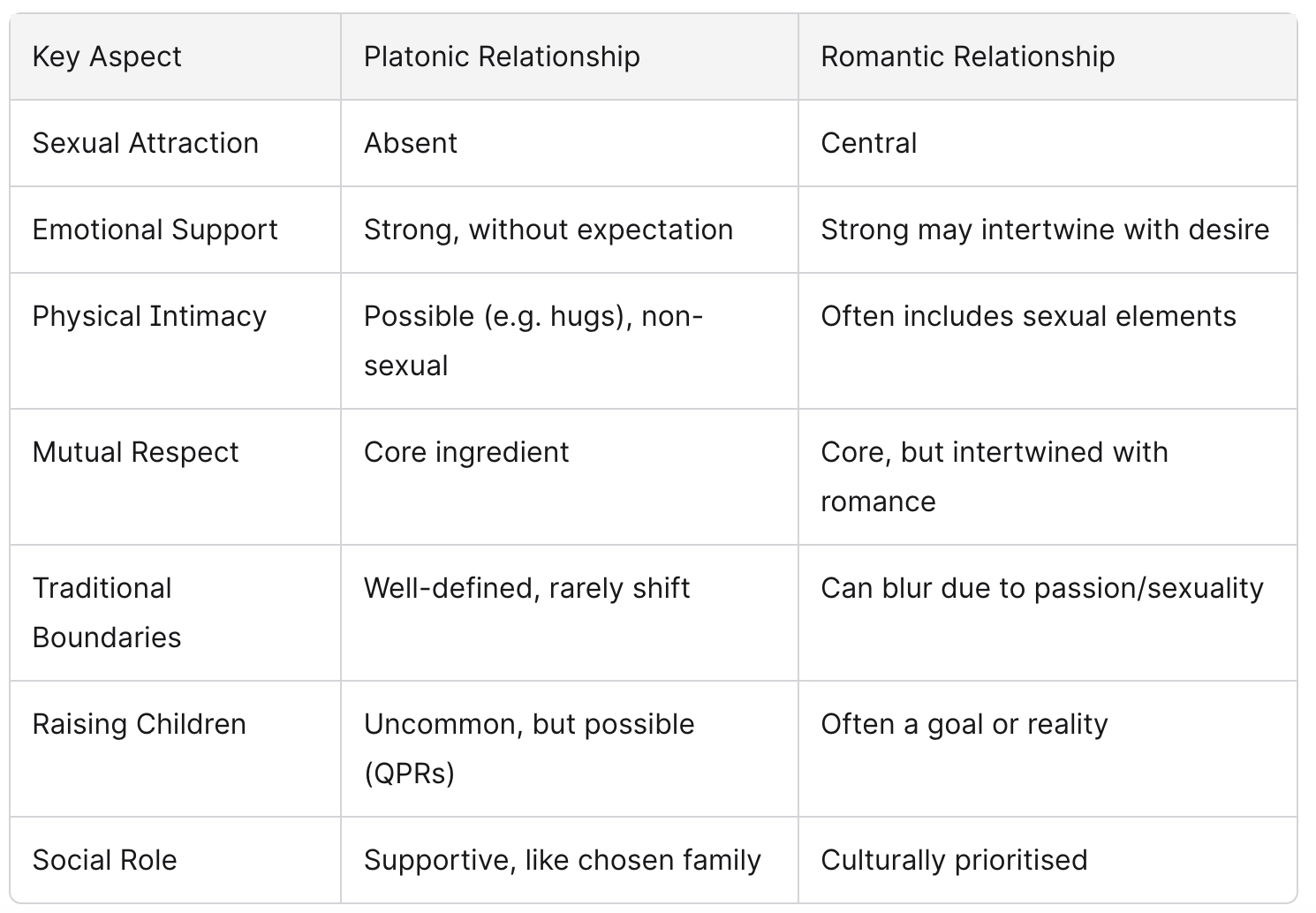Let’s face it: modern life can make human beings’ relationships complicated, blurry, and sometimes downright perplexing. But amidst the romantic love fireworks, awkward first dates, and endless text threads, another kind of connection stands out—one that’s rich, meaningful, and gloriously free of sexual desire or romantic undertones.
What Is a Platonic Relationship: The Heart of Connection
A platonic relationship means a deep friendship or close bond grounded in mutual respect, deep affection, and unwavering trust, but absolutely no romantic involvement or sexual attraction. In such non non-sexual connection, you might love someone fiercely, laugh until you snort together, and share your deepest secrets—all while romance or physical intimacy remains strictly off the table.
The concept comes from the ancient philosopher Plato and his thought that some relationships—involving strong friendship, emotional support, and mutual understanding—can raise us to our best selves, without sexual elements or passionate love getting in the way.
The Platonic Blueprint: What Sets It Apart?
- No Sexual or Romantic Element: At its core, a platonic relationship has no romantic or sexual element. You may cuddle, joke, or enjoy others' company, but there’s no expectation of sexual intercourse, physical attraction, or becoming sexually interested. This simplicity makes things clear, leaving no room for confusion or unrequited relationship drama.
- Deep, Genuine Affection: Platonic love means you might go out of your way for platonic friends—helping them through life's challenges, sharing a funny joke, or being a supportive ear when health challenges or an unequal balance in life appear.
- Emotional Intimacy: Here, emotional support and honesty flourish, sometimes even more than in romantic partnerships or same sex friendships. You can talk about dreams, fears, even high blood pressure, without filtering or pretending.
- Support Without Strings: Supportive platonic friendships provide emotional support for mental health, fostering psychological well-being and resilience. There’s no scoreboard or expectation of romantic partner benefits—just caring for each other through life’s ups and downs.
- Not Just “Friendship Light”: A common myth is that platonic relationships are less significant. In reality, many consider new platonic relationships or those established in online communities and social networking groups as rare gifts, often outlasting romantic partnerships and proving foundational over time.
Platonic vs. Romantic Relationships

The Science and Psychology of Platonic Bonds
Why Do We Need Platonic Relationships?
Platonic friendships help people:
- Navigate life's challenges after setbacks.
- Reduce stress with unconditional acceptance.
- Provide honest feedback without romantic undertones.
- Foster personal growth in a way that romantic relationships or sexual desire may not.
Fun Fact: Strong, supportive platonic friendships are linked to better mental health, lower risk of high blood pressure, improved psychological well-being, and longer life.
Common Myths About Platonic Relationships
Can Men and Women Be “Just Friends”?
Opposite sex friendships and even those between two women or in heterosexual relationships can flourish without romantic obstacles. Research in social and personal relationships shows most people can maintain boundaries and remain platonic, despite society’s focus on the “When Harry Met Sally” myth.
Does “Platonic” Mean “Less Important”?
Platonic friends often play a more significant role across all relationships, serving as primary support when romantic flames or other relationships fade.
Is There Such a Thing as Platonic Romance?
Yes! Especially in queerplatonic relationships (QPRs) within online communities, people blend aspects of romantic love (commitment, cohabitating, raising children, sharing traditional boundaries) with the supportive, non sexual foundation of platonic love.
.jpg)
How to Nurture a Platonic Relationship
- Communication is Key: Share your appreciation and set clear boundaries—a healthy way to respect others' personal space.
- Show Up: Whether in person or via social networking groups, maintain the connection during life’s challenges.
- Recognise and Express Gratitude: Whether for a close friend from work or a new platonic relationship found in online communities.
- Celebrate, Support, Laugh: Maintain boundaries, cherish the deep affection, and treasure this rare gift.
The Evolving Landscape: Platonic Love Today
Feelings can change, and boundaries might blur. If ever the lines between friendship and romance begin to fade for one or both people:
- Talk kindly and honestly.
- Respect each other’s needs.
- Revisit boundaries if needed.
Platonic relationships, after all, are rooted in trust and openness—qualities that can weather almost any shift.
When a Platonic Relationship Becomes Complicated
If sexual attraction, romantic undertones, or physical intimacy start to surface, honest dialogues about feelings and maintaining boundaries will ensure you both feel secure and respected.
Classic Examples of Platonic Relationships
- Sherlock Holmes and Dr. Watson: The model of strong friendship without any romantic interest.
- Anne Shirley and Diana Barry: Kindred spirits, affectionate relationship, deeply supportive platonic friendships.
- Frodo and Sam: Demonstrate unwavering support, deep bond, and love without physical attraction or romantic involvement.
Cherish your platonic friends—they are a rare gift and can play the most significant role in your life's challenges, joys, and everything in between.
So, What Is a Platonic Relationship? (A Quick Recap)
A platonic relationship is a close, supportive friendship with strong emotional bonds, but no sexual or romantic interest. Born from ancient philosophy and still thriving in our hyper-connected world, these relationships give our lives depth, comfort, and—let’s admit it—a welcome break from love’s drama.
Cherish your platonic friends. They’re the ones who’ll help you navigate heartbreak, celebrate your weirdness, and bring you chocolate when the world feels cruel, not because they want anything in return, but because they simply care.

.png)
.png)




